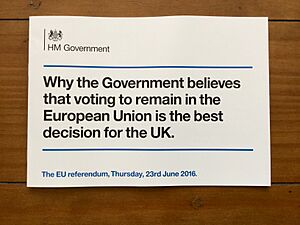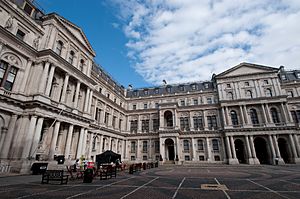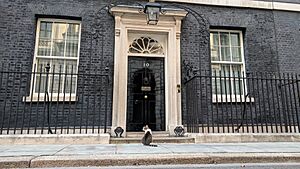Government of the United Kingdom facts for kids
Quick facts for kids His Majesty's Government |
|
|---|---|
| Welsh: Llywodraeth ei Fawrhydi Irish: Rialtas a Shoilse Scottish Gaelic: Riaghaltas a Mhòrachd |
|
|
Central government
|
|
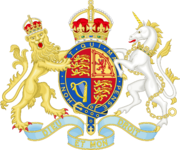
Royal Arms version used by the UK Government as of April 2024
|
|
| Overview | |
| State | |
| Leader | Prime Minister (Sir Keir Starmer) |
| Appointed by | Monarch of the United Kingdom (Charles III) |
| Main organ | Cabinet of the United Kingdom |
| Ministries | 23 ministerial departments, 20 non-ministerial departments |
| Responsible to | Parliament of the United Kingdom |
| Annual budget | GB£1,189 billion |
| Headquarters | 10 Downing Street, London |
His Majesty's Government (often called HM Government or the UK Government) is the main group that runs the United Kingdom. It is in charge of making decisions and carrying out laws for the whole country.
The government is led by the Prime Minister. Currently, this is Keir Starmer, who took office on July 5, 2024. The Prime Minister chooses other important people called ministers. These ministers help run different parts of the government. Since 2024, the UK has had a government led by the Labour Party.
The Prime Minister and their most important ministers form a special group called the Cabinet. This group makes the biggest decisions for the country.
Ministers are responsible to the Parliament. They answer questions and explain their plans in Parliament. Most senior ministers are members of the House of Commons. This is the part of Parliament whose members are elected by the public.
The government needs Parliament's approval to make new laws. General elections are usually held every five years. This is when people vote for new members of the House of Commons. After an election, the monarch chooses the leader of the party with the most support in the House of Commons to be Prime Minister.
The UK has an uncodified constitution. This means its rules are not all written in one document. The King or Queen has the main authority, but they follow the advice of the government. Many government offices are in areas like Westminster or Whitehall in London. So, sometimes people use these names to refer to the UK government.
Contents
How the UK Government Works
The United Kingdom is a constitutional monarchy. This means it has a King or Queen as its head of state. However, the monarch does not make political decisions. All political choices are made by the government and Parliament. This system has developed over many centuries. It started with important steps like the Magna Carta in 1215.
Since 1901, the Prime Minister has always been an elected member of Parliament (MP). This means they must answer to the House of Commons. The person in charge of the country's money, called the Chancellor of the Exchequer, is also usually an elected MP. This makes sure they can be directly questioned by other MPs.
The Government and the Crown
The British monarch is the head of state. This means they are the official symbol of the country. But they are not the head of government. The monarch stays neutral in politics and does not directly run the country.
However, the government gets its power from the monarch. This power is known as the Crown. The government uses these powers to run the country.
The Crown also has special powers called the Royal Prerogative. These powers cover many things, from giving out passports to declaring war. By tradition, the monarch lets ministers use most of these powers. This means ministers can use them without needing Parliament's direct approval each time.
The Prime Minister also meets with the monarch every week. In these meetings, the monarch can share their thoughts on government matters. But the King or Queen always follows the advice of their ministers. These meetings are kept secret.
Powers of the Government
The government uses the royal prerogative powers for many things. These include:
- Choosing the Prime Minister. The monarch appoints the person most likely to have the support of the House of Commons.
- Appointing other ministers. The monarch does this on the Prime Minister's advice.
- Approving new laws. When Parliament passes a bill, the monarch gives it royal assent. This makes it an official law. No monarch has refused to approve a bill since 1708.
- Giving ranks to officers in the Armed Forces.
- Commanding the Armed Forces. This power is used by the Defence Council in the King's name.
- Appointing members to the Privy Council. This is a group of advisors to the monarch.
- Managing British passports. This includes issuing or taking away passports.
- Granting pardons for crimes.
- Giving out honours like knighthoods.
- Creating new organisations or cities through special documents called royal charters.
Foreign Powers
The government also uses royal prerogative powers for international matters. These include:
- Making and signing treaties with other countries.
- Declaring war and making peace.
- Sending the Armed Forces to other countries.
- Recognising other states as official countries.
- Receiving diplomats from other nations.
The UK does not have a single written constitution. However, the government shared this list of powers in 2003. This was to make it clearer how these powers are used. Many of these powers come from old traditions.
Ministers and Government Departments
In 2019, there were about 120 government ministers. They are supported by over half a million civil servants. These civil servants work in 25 main government departments. There are also 20 other departments with different jobs.
Ministers usually need to be members of either the House of Commons or the House of Lords. This makes sure they can be questioned by Parliament. Sometimes, a Prime Minister might appoint someone who is not yet in Parliament. If so, that person usually becomes a member of the House of Lords soon after.
Government in Parliament
The government needs the support of the House of Commons to stay in power. It needs this support to pass its budgets and make new laws. If the government loses the support of the House of Commons, it must either resign or call a new election.
The Prime Minister answers questions from MPs during Prime Minister's Questions (PMQs) every week. This is a chance for MPs from all parties to ask the Prime Minister about anything. There are also special question times for different government departments. During these, ministers answer questions about their specific areas.
When the government proposes a new law, ministers lead the discussions in Parliament. They explain the bill and answer questions from MPs or Lords.
Committees in both the House of Commons and House of Lords also check the government's work. They look closely at proposed laws. Ministers often appear before these committees to give information and answer questions.
Ministers must also make important announcements about government policy in Parliament. This allows MPs and Lords to question them. If the government makes big announcements outside Parliament first, it often gets criticised.
Where the Government is Based
The Prime Minister's main office and home is at 10 Downing Street in Westminster, London. Cabinet meetings also happen here. Most government departments have their main offices nearby in an area called Whitehall.
Limits on Government Power
The government has many powers. These include making laws and appointing people to various roles. However, there are limits to its power. Judges and local authorities (like city councils) are largely independent. The government's powers are also limited by old laws and new laws passed by Parliament. Courts can check if the government is using its powers correctly. This is called judicial review.
Local authorities have some independence. But the government can step in if a local authority is not doing its job properly.
The monarch cannot be charged with crimes. They can only be sued with their permission. This is called sovereign immunity. The monarch is not required to pay income tax by law. However, Queen Elizabeth II chose to pay it voluntarily from 1993 until her death.
The government also has a lot of influence over local authorities through money. Many services provided by local councils, like housing benefits, are funded by the central government.
Neither the central government nor local authorities can sue anyone for defamation (spreading false information). Individual politicians can sue people for defamation, but they must do so personally and not use government money.
Who is Part of the Government?
The "government" usually means the group of ministers currently in power. But sometimes it also includes other people or groups who work for the ministers. The civil service is often seen as part of the government. This is because civil servants work closely with ministers. They advise them, support them, and help carry out their decisions.
Some people who work for ministers even have "Government" in their job titles. Examples include the Government Actuary and the Government Chief Scientific Adviser. Organisations like the Government Statistical Service are also part of this wider definition. Companies owned by the government, like UK Government Investments, can also be seen as part of the government.
Devolved Governments
Since 1999, some powers of the central government have been given to other governments. These are the governments in Scotland, Wales, and Northern Ireland. These are called "devolved governments." They are not part of His Majesty's Government. They are responsible to their own parliaments or assemblies. There is no devolved government for England.
Local Government
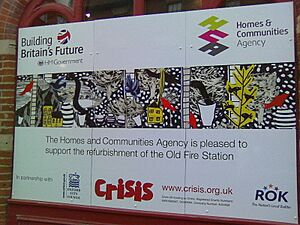
Across the UK, there are different levels of elected local authorities. These include county, district, and parish councils. In some places, these are combined into unitary authorities. These local councils have limited power to raise local taxes. Many other local groups also have powers given to them by law. They are usually supervised by the central government.
See also
 In Spanish: Gobierno del Reino Unido para niños
In Spanish: Gobierno del Reino Unido para niños
- Constitutional reform in the United Kingdom
- Departments of the United Kingdom Government
- Supreme Court of the United Kingdom
- Gov.uk
- Government spending in the United Kingdom
- British Government Frontbench
- His Majesty's Most Loyal Opposition
- List of British governments
- Northern Ireland Executive
- Scottish Government
- Welsh Government
- Whole of Government Accounts
- Office for Veterans' Affairs


